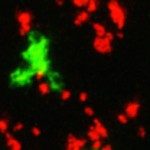Link to Pubmed [PMID] – 21788345
Cancer Res. 2011 Oct;71(20):6428-37
The differences in function, location, and migratory pattern of conventional dendritic cells (cDC) and plasmacytoid DCs (pDC) not only point to specialized roles in immune responses but also signify additive and interdependent relationships required to clear pathogens. We studied the in vivo requirement of cross-talk between cDCs and pDCs for eliciting antitumor immunity against in situ released tumor antigens in the absence or presence of the Toll-like receptor (TLR) 9 agonist CpG. Previous data indicated that CpG boosted tumor-specific T-cell responses after in vivo tumor destruction and increased survival after tumor rechallenges. The present study shows that cDCs are indispensable for cross-presentation of ablation-released tumor antigens and for the induction of long-term antitumor immunity. Depletion of pDCs or applying this model in type I IFN receptor-deficient mice abrogated CpG-mediated responses. CD8α(+) cDCs and the recently identified merocytic cDCs were dependent on pDCs for CpG-induced upregulation of CD80. Moreover, DC transfer studies revealed that merocytic cDCs and CD8α(+) cDCs were most susceptible to pDC help and subsequently promoted tumor-free survival in a therapeutic setting. By transferring wild-type pDCs into TLR9-deficient mice, we finally showed that TLR9 expression in pDCs is sufficient to benefit from CpG as an adjuvant. These studies indicate that the efficacy of CpG in cancer immunotherapy is dependent on cross-talk between pDCs and specific subsets of cDCs.

